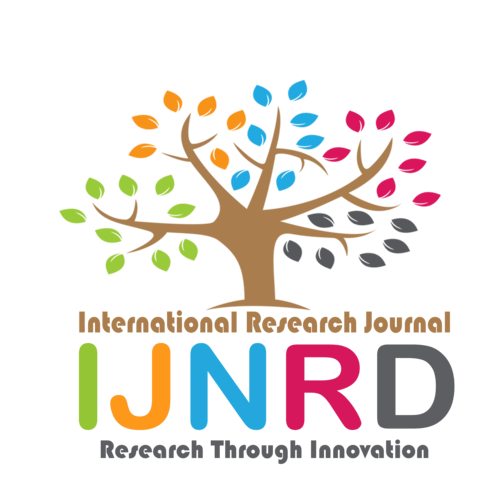|
|||||||||||||||

|
INTERNATIONAL JOURNAL OF NOVEL RESEARCH AND DEVELOPMENT International Peer Reviewed & Refereed Journals, Open Access Journal ISSN Approved Journal No: 2456-4184 | Impact factor: 8.76 | ESTD Year: 2016 Scholarly open access journals, Peer-reviewed, and Refereed Journals, Impact factor 8.76 (Calculate by google scholar and Semantic Scholar | AI-Powered Research Tool) , Multidisciplinary, Monthly, Indexing in all major database & Metadata, Citation Generator, Digital Object Identifier(DOI) |
||||||||||||||
Issue: May 2024
Volume 9 | Issue 5
Review Result and Publication of Paper within : 2-3 days
Click Here For more DetailsFor Authors
Forms / Download
Published Issue Details
Editorial Board
Other IMP Links
Facts & Figure
Impact Factor : 8.76
Issue per Year : 12
Volume Published : 9
Issue Published : 96
Article Submitted :
Article Published :
Total Authors :
Total Reviewer :
Total Countries :
Indexing Partner
Join RMS/Earn 300
Licence
This work is licensed under a Creative Commons Attribution-NonCommercial 4.0 International License







|
Published Paper Details
|
|
| Paper Title: | “An Empirical Case Study on Assessment and Attainment of Course Outcomes, Program Outcomes and Program Specific Outcomes : A Simplified Outcome Based Education (OBE) Approach towards empowering the students for a diploma Engineering program as per Self Assessment Report - Jan.2019”. |
| Authors Name: | Devidas Vanve , Prathmesh Patil |
| Download E-Certificate: | Download |
| Author Reg. ID: |
IJNRD_203165
|
| Published Paper Id: | IJNRD2308042 |
| Published In: | Volume 8 Issue 8, August-2023 |
| DOI: | |
| Abstract: | Education is a process of imparting knowledge, skills, and information from educators to students through teaching, learning, and practice. However, the conventional education system lacks the ability to evaluate students' capabilities effectively. It primarily assesses their learning by encouraging them to reproduce the exact content from textbooks as answers to questions. Nevertheless, the contemporary learning system demands a shift from an output-oriented approach to an outcome-oriented one. In response to this need, the Indian education system has implemented the OBE System, facilitated by the NBA. In recent years, OBE has become a significant focus for many educational establishments in India, particularly among engineering colleges and universities, due to the mandatory requirement set by the National Board of Accreditation (NBA) for program accreditation. The NBA has introduced a revised edition of the SAR, specifically for engineering colleges, universities in the entire country. This report encompasses nine distinct criteria that evaluate various aspects of diploma engineering education provided by these institutions. The criteria are designed to meticulously evaluate the quality of engineering education provided by various departments affiliated with a Board or University The NBA places emphasis on OBE in order to enhance the standard of all type of education. To measure the program's quality, the NBA has formulated specific program outcomes that graduates are expected to obtain from any educational institute during their course of study. The effectiveness of any stream relies on achieving CO and PO. However, there appears to be a lack of comprehension among engineering faculty members regarding the calculation of Course Outcome (CO) to Program Outcome (PO) attainment. CO-PO mapping and its attainment calculations are essential components of Outcome-Based Education (OBE), facilitating continuous quality improvement and serving as feedback for the OBE loop. The NBA has explicitly outlined the OBE system in criteria 2, 3, and 7. This research study aims to enhance course objectives in alignment with outcome-based education principles and update curriculum development accordingly. Its objective is to propose precise assessment techniques and evaluation methods to measure the achievement of CO and POs for Engineering Diploma Programs as defined by the NBA. Implementing this model will significantly enhance the technical knowledge of engineers in the twenty-first century. Course Outcomes (COs) are specific statements that delineate the intended learning outcomes of a particular course. They provide a clear understanding of what learners are expected to comprehend, the skills they should acquire, the ethical principles they should adhere to, and the knowledge and behaviors they should demonstrate upon completing the course. While Programme Outcomes (POs) are precise determinable statements that outline the required knowledge, gained skills, and students behaviors are expected to possess upon successful completion of a program of study. POs can be measured straight way through COs. It is essential to assess and evaluate course outcomes at the end of all courses to determine their attainment. Criterion 3 specifically evaluates the achievement of POs by assessing the attainment of COs. Additionally, criterion 7 heavily relies on criterion 3, while criterion 2 also bears some dependence on criterion 3. Evaluating the attainment of COs and POs by direct and indirect methods allows for comparing the target level and serves as a measure to ensure the accuracy of CO-PO mapping. This approach provides a simplified yet robust method for computing the achievement of COs and program outcomes and can be reached to evaluate PSOs as well. To achieve accurate evaluation of COs and POs, it is beneficial to employ an effective strategy that utilizes direct as well as indirect measurement method to evaluate student performance. Internal assessment tests, assignments, and final exams are commonly used in most engineering colleges as direct as well as indirect measurement method to evaluate student performance. Careful selection of assessment tools for CO-PO attainment is crucial to accurately assess students' knowledge and skills. This paper provides an overview of the methodology employed to examine the achievement of COs and Program Outcomes for the sample subject Advanced Surveying (ASU-22301) in the context of a Civil Engineering program for second year diploma in the 3rd semester, consisting of 66 students. The assessment methodology utilizes data derived from the students' performance in final theory and practical exams. This evaluation process not only takes into account the semester marks but also considers internal credits, practical credits, assignment and micro and major projects, industry internships, and various exit surveys related to Course and Program Outcomes. To facilitate efficient computation and analysis, a computerized Microsoft Office Excel spreadsheet system has been developed and utilized as part of this methodology. The generated results serve as a valuable tool for continuous quality improvement and informing future course delivery strategies. |
| Keywords: | National Board of Accreditation (NBA), All India Council for Technical Education (AICTE), Outcome Based Education (OBE), self-assessment report (SAR) ,MSBTE, CO,PO,PSO, Mapping, Attainment. |
| Cite Article: | "“An Empirical Case Study on Assessment and Attainment of Course Outcomes, Program Outcomes and Program Specific Outcomes : A Simplified Outcome Based Education (OBE) Approach towards empowering the students for a diploma Engineering program as per Self Assessment Report - Jan.2019”.", International Journal of Novel Research and Development (www.ijnrd.org), ISSN:2456-4184, Vol.8, Issue 8, page no.a370-a380, August-2023, Available :http://www.ijnrd.org/papers/IJNRD2308042.pdf |
| Downloads: | 000118749 |
| ISSN: |
2456-4184 | IMPACT FACTOR: 8.76 Calculated By Google Scholar| ESTD YEAR: 2016 An International Scholarly Open Access Journal, Peer-Reviewed, Refereed Journal Impact Factor 8.76 Calculate by Google Scholar and Semantic Scholar | AI-Powered Research Tool, Multidisciplinary, Monthly, Multilanguage Journal Indexing in All Major Database & Metadata, Citation Generator |
| Publication Details: |
Published Paper ID:IJNRD2308042 Registration ID: 203165 Published In: Volume 8 Issue 8, August-2023 DOI (Digital Object Identifier): Page No: a370-a380 Country: Ahmednagar, Maharastra, India Research Area: Civil Engineering Publisher : IJ Publication Published Paper URL : https://www.ijnrd.org/viewpaperforall?paper=IJNRD2308042 Published Paper PDF: https://www.ijnrd.org/papers/IJNRD2308042 |
| Share Article: | |
|
Click Here to Download This Article |
|
| Article Preview | |
|
|
|
Major Indexing from www.ijnrd.org
| Semantic Scholar | Microsaoft Academic | ORCID | Zenodo |
| Google Scholar | ResearcherID Thomson Reuters | Mendeley : reference manager | Academia.edu |
| arXiv.org : cornell university library | Research Gate | CiteSeerX | PUBLON |
| DRJI | SSRN | Scribd | DocStoc |
ISSN Details
 |
 |
ISSN: 2456-4184
Impact Factor: 8.76 and ISSN APPROVED
Journal Starting Year (ESTD) : 2016
DOI (A digital object identifier)
Conference
Open Access License Policy
Important Details
Social Media
| Copyright © 2024 - All Rights Reserved - IJNRD |












Facebook Twitter Instagram LinkedIn